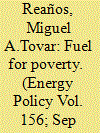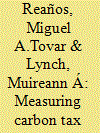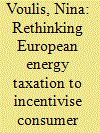| Srl | Item |
| 1 |
ID:
109319


|
|
|
|
|
| Publication |
2011.
|
| Summary/Abstract |
Welfare analyses of energy taxes typically show that systems with uniform rates perform better than differentiated systems. However, most western countries include some exemptions for their energy-intensive export industries and thereby avoid this potential welfare gain. Böhringer and Rutherford (1997) find that uniform taxation of carbon emissions in combination with a wage subsidy preserves jobs in these industries at a lower welfare cost compared with a differentiated system. The wage subsidy scheme generates a substantial welfare gain per job saved. This study, however, finds that welfare costs are substantial when less accurate policy measures, represented by production-dependent subsidies, protect jobs in Norwegian electricity-intensive industries. The welfare cost per job preserved by this subsidy scheme amounts to approximately 60% of the wage cost per job, suggesting that these jobs are expensive to preserve. A uniform electricity tax combined with production-dependent subsidies preserves jobs at a lower welfare cost compared with the current differentiated electricity tax system.
|
|
|
|
|
|
|
|
|
|
|
|
|
|
|
|
| 2 |
ID:
179710


|
|
|
|
|
| Summary/Abstract |
A new approach rooted in economic theory is proposed to analyse the relationship between fuel poverty and income poverty using self-reported data. The model shows that neglecting the overlap between income and fuel poverty underestimates the metrics for the change in income poverty due to increases in carbon taxes. The model is parametrized using econometric methods. Being a single adult with dependent children, having low education levels, low income levels and having darkness or dampness in the dwelling increases the probability of being fuel poor. The estimates show that an 1% increase in carbon taxes will raise the number of people experiencing fuel poverty by 0.5%. It is also shown that while increases in lump-sum transfers are progressive, increases in energy prices and energy required to heat a dwelling are regressive. Among poor households, fuel poor households have the lowest income levels, have issues with dampness, and it is less likely that they have double glazing in their dwellings compared to other income poor households. Income and fuel poverty are two distinctive problems that require different policy instruments. Policies need to address income and energy efficiency inequalities simultaneously to counteract the regressive effect of carbon taxes in Ireland.
|
|
|
|
|
|
|
|
|
|
|
|
|
|
|
|
| 3 |
ID:
183057


|
|
|
|
|
| Summary/Abstract |
We quantify the vertical (i.e. between income differences) and horizontal (i.e. within income differences) distributional effects of carbon taxation using a fully flexible demand system and Irish data. The model avoids imposing the curvature of the relationship between income and energy demand. We show that neglecting this fact can lead to misleading policy conclusions. We also show that losses in purchase power are the main channel of welfare losses. Losses due to limitations for energy substitution play a minor role. We found that rural households and householders in retirement age are the most affected by carbon taxation. Regarding horizontal effects, we show that higher heterogeneity in the tax burden is experienced by couples with dependent children and those in urban households. These findings highlight the importance of quantifying both horizontal and vertical distributional effects when designing carbon taxes and revenue recycling mechanisms. Within distributional effects are larger than between distributional effects regarding income inequality of the tax and revenue recycling mechanisms. We found that a targeted transfer is preferred over a lump-sum transfer in reducing welfare losses caused by the regressivity of taxation. These findings hold when measuring both horizontal and vertical distributional effects.
|
|
|
|
|
|
|
|
|
|
|
|
|
|
|
|
| 4 |
ID:
162896


|
|
|
|
|
| Summary/Abstract |
The European Union considers demand response to be an integral part of its future energy vision, in particular as a supporting mechanism for renewable resource integration. To achieve high demand response participation, the European Union recognises the need for adequate financial incentives for all consumers, especially for residential and service sector consumers. However, the European Energy Tax Directive, which regulates energy taxation in the European Union, is currently not in alignment with this vision, as it does not provide any financial incentives for demand response participation. This paper explores the potential of energy taxes to provide such incentives. First, through an analysis of the current energy taxation and demand response literature. Second, by quantifying the difference in financial incentives between two tax designs (per-unit and ad valorem taxes) in a simulation case study of consumers heat pumps in the Netherlands. Results show that financial incentives are 3.5 times higher for the ad valorem tax than for the per-unit tax. The paper concludes with recommendations for policy makers for the design of energy taxes that provide residential and service sector consumers with adequate financial incentives for demand response participation.
|
|
|
|
|
|
|
|
|
|
|
|
|
|
|
|